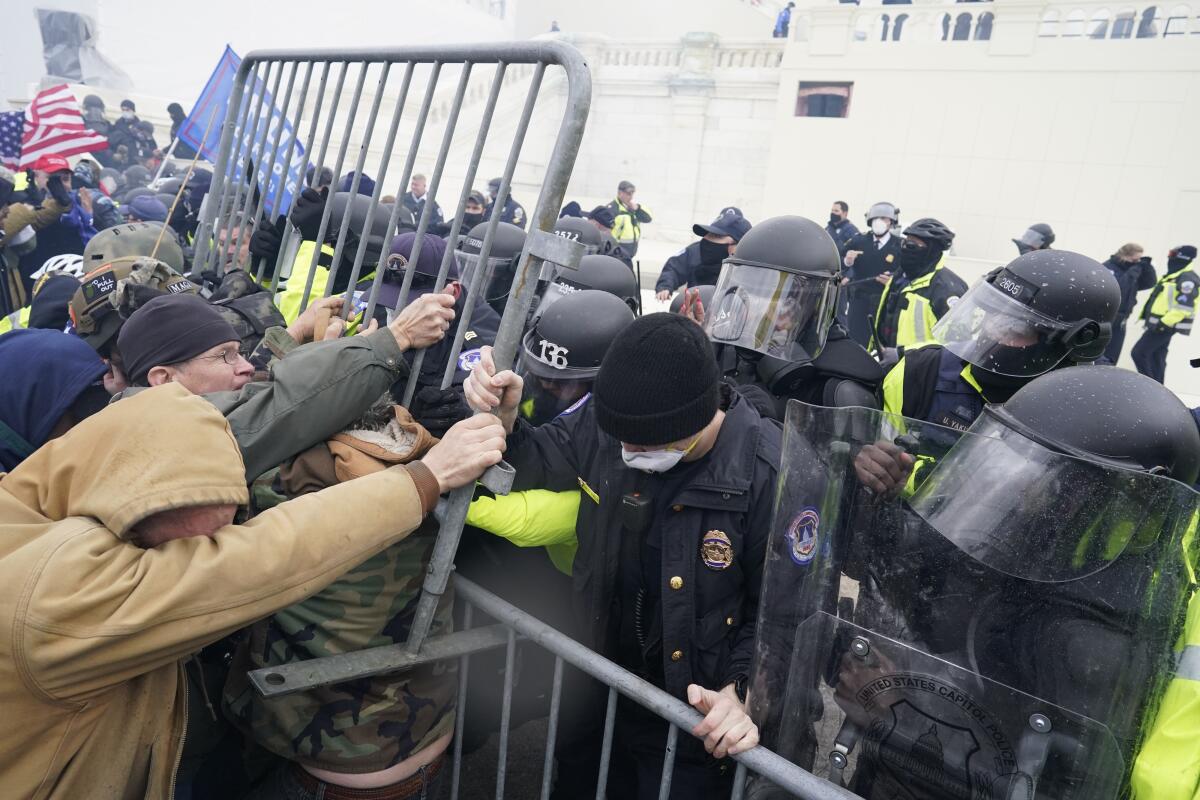Why the GOP is terrified of a Jan. 6 commission

- Share via
Last summer, after months of protests and riots in response to the murder of George Floyd, the phrase “mostly peaceful,” often used by the media and Democrats to describe the protests, achieved parody status, thanks to a CNN clip.
It showed a reporter in Kenosha, Wis., standing in front of a burning building and cars ablaze. CNN’s chyron read, “FIERY BUT MOSTLY PEACEFUL PROTESTS AFTER POLICE SHOOTING.”
Conservatives loved it — me included. It summed up a long, hot, pandemic summer of being told not to believe our lying eyes when it came to the violence we saw either on our TVs or in our communities. Thousands of properties and businesses around the country had been burned, damaged or looted, costing billions.
Still, the reality was a bit more complicated. The “mostly peaceful” thing was mostly true. A study by the Armed Conflict Location and Event Data Project found that 93% of protests were, in fact, peaceful. Part of the problem, according to the authors, was that the media couldn’t resist showing images of violence (duh!), which created a misperception about the protests.
Conservative critics of the finding rightly noted that focusing on the peaceful protests, some of which became violent, missed the point. First, violence is always committed by a small avant-garde. Downplaying the violence, even making apologies for it, ignores the way in which the rhetoric of protesters can foment violence.
Fast forward to 2021. In the wake of the siege of the U.S. Capitol by a mob supporting Donald Trump, the right now clings to the “mostly peaceful” canard.
In March, Sen. Ron Johnson (R-Wis.) insisted on a radio show that he wasn’t scared of the Jan. 6 mob, but he would have been if they were from Black Lives Matter. Responding to the backlash to his comments, he wrote in the Wall Street Journal: “Leftists who want to memory hole last summer’s political violence immediately started lecturing me that the 2020 protests were mostly peaceful.” He cited the ACLED study as proof.
In April, he told the Milwaukee Journal Sentinel that the Jan. 6 crowd was “mostly peaceful.” And last week, Johnson tweeted: “More than 20,000 Americans exercised 1st Amendment rights to march peacefully Jan. 6. USCP says 800 entered the Capitol illegally …. that’s not an armed insurrection and it was, by-and-large, peaceful.” According to this thinking, if a few hundred of the attackers fighting the police on the Capitol steps with bear spray and flagpoles never actually made it inside the building, then the Jan. 6 mob was about 93% peaceful, too.
Johnson, like most congressional Republicans, opposes a commission to study the Jan. 6 siege. He claims it’s just a partisan Democratic effort to push a “false narrative” about Trump. Johnson sounds reasonable compared to other Republicans who’ve claimed, variously, that Jan. 6 looked no different than a “normal tourist visit” or that the siege was a false flag operation conducted by Antifa or Black Lives Matter. Trump describes the mob that eventually chanted “Hang Mike Pence” as a “love fest.”
All of this has had an effect. Some 55% of Republicans recently told Ipsos/Reuters that they strongly or somewhat agree that the riot at the Capitol was led by “violent left-wing protesters trying to make Trump look bad.” Nearly the same number believe the protesters were “mostly peaceful.” And 53% think Trump is the actual president while 60% strongly or somewhat believe that the election was stolen from Trump.
Those last two findings are crucial because the violence was motivated by these false beliefs. It’s amazing how easily Republicans can see how the rhetoric of BLM activists can create a permission structure for violence, but become utterly blind to the same point when it comes to violence at the seat of our government.
There are many legitimate arguments against a special commission to study Jan. 6. Congress has the power to investigate already — and is doing so. Many Democrats surely want to use the commission to score partisan points. There are hundreds of criminal cases underway and Congress should be reluctant to muck with them.
The problem with all of such arguments, often made in good faith by conservative writers, is that they have nothing to do with why elected Republicans don’t want a commission. It’s all pretext designed to distract from the fact that most of the GOP is terrified of contradicting the false narratives still being peddled by Trump and embraced by his core supporters.
It’s absolutely true that his supporters are mostly peaceful. But that misses the point entirely — and deliberately.
More to Read
A cure for the common opinion
Get thought-provoking perspectives with our weekly newsletter.
You may occasionally receive promotional content from the Los Angeles Times.










